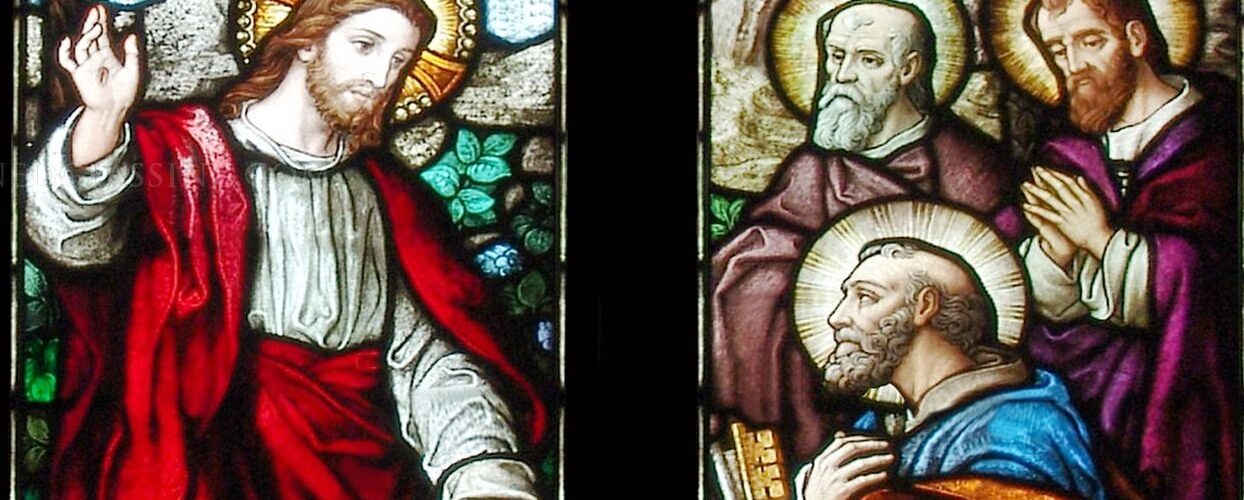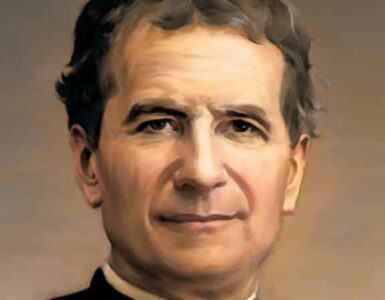One of the main themes which emerge in the Gospel of St John is, clearly, life. Already in the prologue of the Fourth Gospel we find the theme of life mentioned twice whereas within the entire Gospel text we find it mentioned some 47 times. Hence, these numbers themselves already indicate its importance.
In another closer look at St John’s Gospel we also encounter the famous seven I am sayings which Jesus utters. In the fifth of these sayings Jesus says: I am the resurrection and the life; he who believes in me, though he die, yet shall he live, and whoever lives and believes in me shall never die (John 11:25-26). What we can easily gather from this saying is that the principal aim of Jesus’ incarnation and immolation on the Cross was specifically to give life. In this perspective, life, from its very nature, is an ever active force. This must be so since the author and originator of life is always dynamic and fully active. Hence, we can also say that life stands as a sort of language thanks to which God speaks to the entire universe. And this seems to be the preoccupation of the evangelist in writing the Gospel, namely to give life to the world or rather to present Jesus as the Life of the Father to those who believe and accept him as Lord in their lives. But in order to appreciate this key Johannine concept in the Fourth Gospel it is paramount that we analyze a bit the various features of the word ‘Life’ within this very profound Gospel.
Fortunately many girls nowadays are being named for St John’s Greek term of life, namely Zoe, although other Greek words for life can be Psuche as well as Bios. Happily enough the Johannine Gospel uses more the word Zoe. It needs to be said that the Greek word for Life offers us a myriad of meanings. Hence, we can say that the word Zoe means divine life whilst Psyche is only natural life. At this point in our discussion it is wise to see how St John uses the word zoe in his Gospel.
In his book The Gospel According to the Beloved Disciple, Jose Maniparambil offers to us various ways in which the word zoe is used by St John. Here we limit ourselves to these eight ways the fourth evangelist uses in his text, namely (1) A life with which God lives; (2) A life that both Father and Son share; (3) The Son Himself is the life; (4) The same life achieved through faith; (5) The Spirit is the life principle; (6) This gift of Spirit is related to Baptism and is nourished by the Eucharist; (7) Life surpasses death; and (8) This life can take away from the believer when he becomes an unbeliever or performs sin.
The New Testament makes use of three Greek words for life. Obviously these three words suggested other derivatives for the word Life like live, lived, living and so forth. When we look at the synoptic Gospels they can help us better appreciate the profound reflective way in which St John used the word Life in his Gospel. Hence, St Luke employed the word Bios for Life. As we stated already, the word Bios is used only for the physical body. On the other hand Matthew uses the word Psuche. With the First Evangelist we see a development from the physiological to the psychological meaning for the word Life. With the word Psuche, Matthew seems to be referring to the life of the soul.
Now, St John goes definitely a step further into his search for meaning for the word Life by purposely using the word Zoe. John does so in order to portray the meaning of divine life which was given to the entire humanity thanks to the incarnation and paschal mysteries of Jesus. In fact, St John wants to prove that human beings can be active participants within the divine life, but only through Jesus Christ.
From what we can gather so far we can easily say that John is unique in the way he uses the word Life. Furthermore, John clearly uses the word Zoe in different shades of meaning. All shades of the word Zoecomplement each other in a remarkable way.
For St John Zoe is a life with which God lives. In the fourth verse of the Prologue, we encounter this line: In Himwas life [zoe], and the life [zoe] was the light of men (John 1:4). By this powerful statement the Fourth evangelist wants to affirm that eternal life dwells in the Triune God. As humans we are entitled for the divine life if and only if God wants the same for us. That is why John clearly states that whoever believes in him may obtain this eternal life. This prerequisite is essential.
The fourth evangelist uses the Greek word Zoe in the sense that it is a life which both the Father and the Son share together. According to St John eternal Life is equally shared among the Trinitarian Persons. Hence, we may also conclude that he is consequentially referring to Perichoresis, or rather the relationship of the Three Persons of the Triune God (Father, Son and Holy Spirit) with each other. In his unfathomable mercy, God the Father willed to send His Son for us, humanity, so that who of us believes in him, Jesus Christ, may have eternal Life. To Nicodemus Jesus solemnly declares: For God so loved the world that he gave his only Son, that whoever believes in him should not perish but have eternal life [zoen] (John 3:16).
Upon reading attentively the Gospel of St John one comes across another important facet of meaning when addressing the concept of life, namely that the Son Himself is the life. In order to lead us in this direction what John does is that he first purposely proves that God and Jesus Christ both live this same Life. For this reason Jesus says in chapter 3: He who believes in the Son has eternal life; he who does not obey the Son shall not see life [zoen], but the wrath of God rests upon him (John 3:36). After this affirmation John intentionally presents to us the Samaritan Woman story so that he proves the claim he does here. In that account we can easily see how Jesus is both the source and summit of eternal life. To the woman from Samaria Jesus says: but whoever drinks of the water that I shall give him will never thirst; the water that I shall give him will become in him a spring of water welling up to eternal life [zoen] (John 4:14). In this account we also notice that the gift of salvation is not merely restricted to Israel but it is extended to all the nations at large.
The concept of Life in John makes him conclude that eternal life (zoe) is attained through faith. In his Gospel John affirms that the believer in Jesus Christ attains the Life thanks to an unshakeable faith. To the unbelievers Jesus declared: Truly, truly, I say to you, he who hears my word and believes him who sent me, has eternal life; he does not come into judgment, but has passed from death to life [zoen] (John 5:24). The Johannine text makes it clear to all of us that it is only through Jesus is one introduced to eternal life. To Thomas Jesus said: I am the way, and the truth, and the life; no one comes to the Father, but by me (John 14:6). It is when Peter met Jesus and let himself be inspired and transformed by him that he was inspired to lay down his will or rather his soul to Jesus. At the presence of Peter at the last supper Jesus says: Greater love has no man than this, that a man lay down his life [psuchēn] for his friends (John 15:13).
In his rendition of the concept of Life John moves on to tell us that it is the Spirit who is the Life principle. The fourth evangelist moves on to conclude that whoever sins against the Holy Spirit is immediately cut off from eternal life. When his disciples protested for his words on his body and blood, the Eucharist, Jesus told them: It is the spirit that gives life, the flesh is of no avail; the words that I have spoken to you are spirit and life (John 6:63).
Another deep connotation concerning the concept of Life in St John’s Gospel is the fact that if the Spirit is Lifethen the gift of the Spirit is intimately connected with Baptism and consolidated by the Eucharist. Hence, eternal life is given to the believer because it is the Holy Spirit’s gift both at the time of Baptism as well as when one is nourished by the Eucharist. In John chapter 6 Jesus said: I am the living bread which came down from heaven; if any one eats of this bread, he will live for ever; and the bread which I shall give for the life [zōēs] of the world is my flesh (John 6:51). What this means is that real life is given to the believer only through Jesus Christ. Furthermore, this giving of divine life is perpetuated in the Church only through the Eucharist. That is why John is mindful of the faith that communicants of the Body and Blood of Jesus are to do so in the greatest spirit of respect and heartfelt devotion.
Adding to this, John, in his Gospel, makes his biggest claim that Life conquers death. The eternal life given to humans, thanks of course to the power of the Holy Spirit, will be superior to death. In his Eucharistic discourse in chapter 6 Jesus said to the unbelievers: So Jesus said to them, “Truly, truly, I say to you, unless you eat the flesh of the Son of man and drink his blood, you have no life [zoen] in you; he who eats my flesh and drinks my blood has eternal life [zoen], and I will raise him up at the last day (John 6:53-54).
Finally St John is careful in warning us that this Life can be lost if the believer ceases to be so. It is only the one who believes in Jesus Christ that will possess eternal life. Woe to the person who, after being convinced that only belief in Jesus brings eternal life, he purposely rejects him. Such a person loses the Life completely since solely Jesus is the resurrection as well as the life. In John 5:29 Jesus says: And come forth, those who have done good, to the resurrection of life, and those who have done evil, to the resurrection of judgment (John 5:29). Whereas in John 5:40 Jesus says: Yet you refuse to come to me that you may have life.
By means of concluding we can say that the word zoe in the Fourth Gospel proves the exclusive giving of Eternal Life to the people by God. Secondly, the believer in Jesus Christ participates in the divine life. In order to enter eternal life we are called, according to John, to make the intentional leap from bios to zoe. This kenotic passage takes place when we surrender both our physical and psychological lives to Jesus by deliberately acknowledging that only He is the LIFE. As the dialogue of Jesus with Peter in chapter 21 amply shows: Truly, truly, I say to you, when you were young, you girded yourself and walked where you would; but when you are old, you will stretch out your hands, and another will gird you and carry you where you do not wish to go.” (This he said to show by what death he was to glorify God.) And after this he said to him, “Follow me” (John 21:18-19). Hence, it is when Peter submitted his will to Jesus that he was able to be part of the divine life.





























